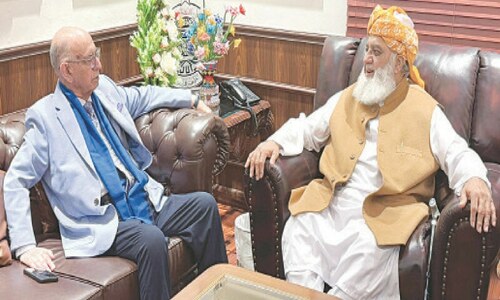WASHINGTON, Nov 26: Pakistan still needs more than $20 billion to cover its current account deficit for the current and the next fiscal years and to make debt repayments, says the International Monetary Fund.
Pakistan’s gross external financing requirement for the current fiscal year, which ends on June 30, 2009, is $13.4 billion while its gross external financing requirement for the next financial year, which ends on June 30, 2010, is estimated at $12.2 billion.
The money is needed to “cover the current account deficit for both fiscal years and the maturing short-term debt and the amortisation on long- and medium-term debt”, said Juan Carlos Di Tata, IMF’s senior adviser for the Middle East and Central Asia.
On Monday Pakistan signed a $7.6 billion loan package with the IMF. The fund is immediately transferring $3.1 to Pakistan’s account in the New York Federal Reserve to help Islamabad avoid defaulting on its debt repayments.
Mr Di Tata said that Pakistan would be able to raise up to $8.8 billion during the current fiscal year through medium- and long-term borrowings from multilateral institutions, bilateral creditors and other sources. This also includes foreign direct investment of about $4.5 billon.
The remaining gap on the order of $4.7 billion will be filled by IMF resources in 2008-09.
“These gross external financing requirements are the critical part of the programme and they are already covered,” said Mr Di Tata. “They are covered by our projection of what is going to be foreign direct investment in Pakistan, and by commitments already made by other international institutions including the World Bank, the Asian Development Bank, and the Islamic Development Bank, some money coming from bilateral donors for projects, and the IMF.” But Pakistan will also need additional donor assistance to cover the social safety net, he added.
Mr Di Tata also clarified that while Pakistan would have immediate access to the first tranche of $3.1 billion, the second tranche would be available after the completion of the first review under the programme in mid-March 2009.
“This programme also has some quarterly targets on several variables including, for instance, the budget deficit, budget borrowing from the State Bank of Pakistan, international reserves, the domestic assets of the State Bank of Pakistan,” he said. “So the second disbursements will be made available, contingent on complying with these quarterly targets. And also we will review some benchmarks on some structural issues that are included in the programme.”
Mr Di Tata also clarified that while the IMF expected Pakistan to reduce its fiscal deficit through the elimination of fuel and electricity subsidies, there were other conditions as well. “There is also a reduction in development spending through better prioritisation of projects. Some projects that the government considers not a priority will be postponed or eliminated,” he added.
The Pakistan Embassy in Washington, however, was very positive that the government would now receive direct bilateral assistance donor countries such as the United States and from the Friends of Pakistan group formed in New York two months ago to help boost the country’s ailing economy.
The group has held two meetings since then, both in the UAE, but did not make financial pledges to Pakistan. Officials of the countries associated with the group – such as the United States and the UAE – had, however, already made it clear that those two meetings were not pledging sessions. The purpose of these meetings was to review investment opportunities in Pakistan, they said.
But Pakistan’s Ambassador in Washington, Husain Haqqani, hopes that the Friends of Pakistan group would now provide up to $4 billion to help Islamabad deal with the current financial crisis.
“The most difficult phase is over,” he said. “Other donors are also coming forward to help rebuild the economy.”















































Dear visitor, the comments section is undergoing an overhaul and will return soon.